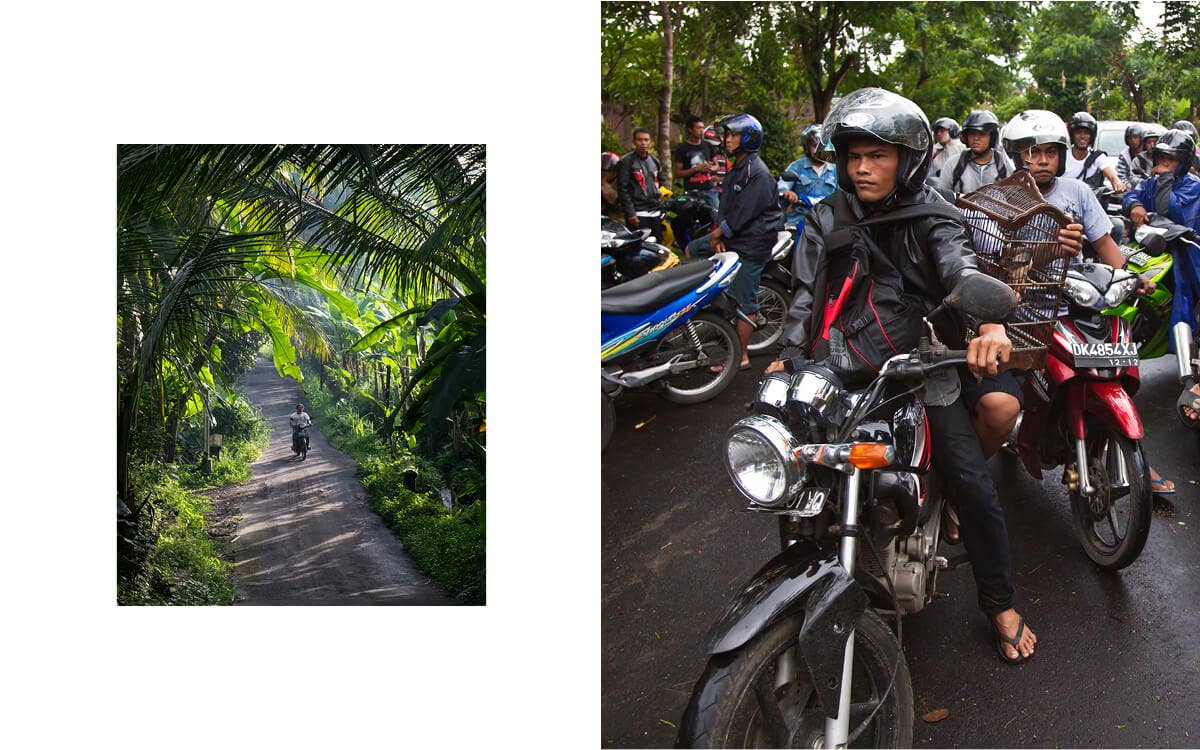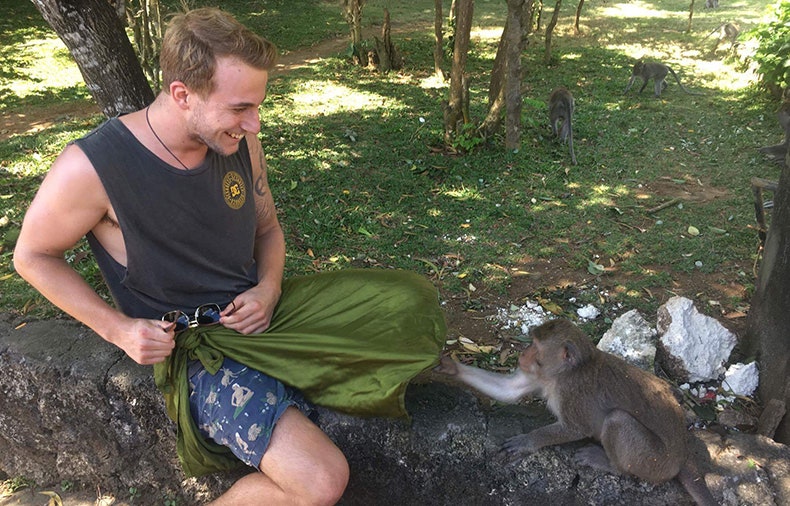The first cock fight I ever saw came free with a litre of gasoline.
Ten minutes by scooter from the cliffs above Uluwatu, perhaps the most famous surf break in Bali, I watched an old woman with toes splayed by a life barefoot pour kerosene into the stomach of my scooter. Tipping the bottle of Absolut Vodka with total nonchalance and perfect aim, she held the lid between her toothless gums, looking off into the distance and, seemingly, back in time.
Petrol in Bali generally comes in an old Absolut vodka bottle and is anywhere from pre-workout blue to canola oil yellow. Only the smell is consistent. And the forecourt experience. There are any number of these ‘service stations’ in Indonesia, but not all of them come with fighting roosters.
Cockfights are a millennia-old tradition in Balinese hinduism. The Balinese word for cock even shares the same double-entendre as in English, and the fact isn’t lost on the locals. As our attendant lit a cigarette and moved on to the next scooter, a group of locals noticed me admiring their birds, who paced back and forward beneath upended wicker baskets. Without hesitation they retrieved two, stroking the rooster’s combs and tweaking their spurs to aggravate the combatants.
On “three” they threw them into the street, where the birds surged at one another, pecking and squawking and tearing with their claws. White feathers dusted the road like a pillow fight to the death. This was an exhibition however and the birds fought without literal knives tied to their legs, so it proved to be one of the more stress-free experiences of the day.
When you’re in Bali, t shirts are optional, even on a motorbike. In New Zealand I wouldn’t get on a motorbike without boots and a jacket, in Bali I wouldn’t get on one with them. Even on the motorway it’s boardshorts and sunnies - a dangerously stupid idea in theory, but recklessly exciting in person. The roads get hot here. Thirty five degrees and no looking back.
I’ve seen the pictures. I know how skin goes when it comes up against tar-seal – roughly half as well as carrot does against a grater. But there’s something about travel that lends an air of invincibility, particularly in a hedonist's paradise like Indonesia. Flirt with a cigarette addiction? Sure! Haggle at the hospital for Xanax? Absolutely. Walk barefoot through shin-deep runoff? What even is septicemia?
I didn’t study the road rules in Indonesia, I’m not really sure there are any. There definitely isn’t insurance, anyway. Or rules regarding passenger limits – one, two, three kids, a dog, a crate of beer, two crates of beer a small child and a dog – it’s all fine.

Uluwatu to Canggu is no more than 35km, but congestion in Bali worsening. Thousands of motorbikes thronged the street, weaving in and out and in front of and behind the screaming trucks and ubiquitous vans. Roundabouts are less a method of managing traffic flow than a whirlpool full of debris where collision equals death or, at the least, degloving.
The buildings that line the roads of Bali are a mixture of haphazard shacks, sculpture workshops housing row upon row of buddhist deities and Hindu pantheons in stone, entire city blocks dominated by swirling dragons and epic battle scenes straight out of the Ramayana, Rip Curl outlets, fast food joints and massage parlour after massage parlour. Perhaps nowhere else on Earth does history and modernity, tradition and pragmatism rub shoulders or share spit like this. We rode past the infamous Hotel K, Bali’s most notorious prison. A day later four prisoners escaped through a tunnel.
“Which way to Canggu?” asked two Brazilians at a traffic light, leaving the safety of what could be called Rio de Uluwatu and heading for less crowded (though shittiter) waves. Three bikes, six passengers and not a shoe in sight.
Canggu beach is like the Raglan of Bali. Yoga studios, permaculture set-ups, conscious eateries and eco-lodges populate the lowland centred around two popular surf breaks. The Deus Temple of Enthusiasm is there, one of the lodestones for a new surfing/motorbike/young steezy person aesthetic. On Tuesday afternoons food and drink come with a free tattoo of fluctuating quality. There’s a rice paddy outside and an intersection. One afternoon, as I smoked my fourth sugary and hissing sampoerna cigarette outside, I saw two white girls in baseball shirts T-bone another girl fresh out of yoga class. A few tears and a cigarette each and they were off. But we weren’t headed to Deus.
The wave at Echo Beach is what’s known as a wedge; a small reef causes a buildup of sand so the swell that rolls in from the Indian Ocean refracts inwards, creating a pyramid shaped wave as opposed to a long, peeling wave. Every now and again a set rolls through, sweeping up the beach and clearing out the more exposed beach umbrellas. A bronzed woman on painkillers or mushrooms or both frolicked in the shadows, holding her cigarette in the air like a leathery Statue of Liberty.
“Kia ora bro!”

The residents of South East Asia have by now developed an intimate knowledge of the customs and culture of the more affluent nations in the region. A street vendor can spot a southern cross
tattoo or a pounamu from a hundred yards, and there’s a contingency plan for either. It’s a good strategy; a bit of banter in te reo Maori and we buy four bracelets. And a couple Bintangs.
Bintangs are balm for the travellers soul. Cheap, refreshing, a respectable 4.5% alcohol content. Back astride the bike but significantly...warmed, we headed into the dusk. The light of the setting sun is sympathetic even to a glass and concrete monstrosity, but on the lush vegetation and mysterious shrines of Indonesia it’s downright transcendent.
Bali at dusk is the smell of incense, frangipani, exhaust fumes and burning plastic. Every night the small flames on the side of the road consume dry fall, banana leaves, plastic bottles, pringles cans and the refuse of a small island opened to the world without waste management.
It’s hardly Zen and the Art of Motorcycle Maintenance but over four hours on Bali’s gnarliest roads, heading downhill towards the setting sun, I understood quality in some sense. But at what risk?
As we left Uluwatu, this time by car, I told the driver about our trip. He was horrified.
“Ah brother, you are crazy. Too much danger. Just crazy.”
Maybe, but he didn’t see the sunset.

